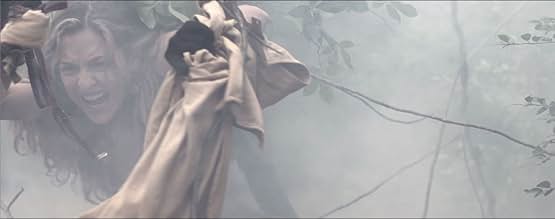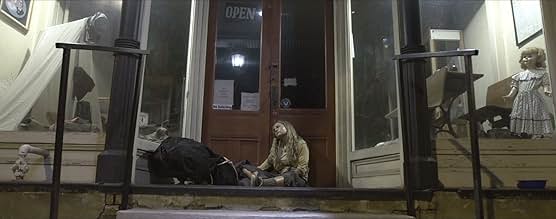Led by a mysterious compass, a homeless woman embarks on a perilous journey to find healing for her broken hands.Led by a mysterious compass, a homeless woman embarks on a perilous journey to find healing for her broken hands.Led by a mysterious compass, a homeless woman embarks on a perilous journey to find healing for her broken hands.
- Awards
- 12 wins & 10 nominations
Storyline
Featured review
I saw Riva when it premiered at the 168 Film Festival on August 30, 2015. It would not be an exaggeration to call it the sensation of the fest. The programmers knew what they were doing when they slated it as the final show of the evening: it had a consummatory effect, like the commencement speech at a high school graduation ceremony. The director-cinematographer-editor, Christopher Wiegand, has an artist's eye and a musician's sense of rhythm. He prefers to work largely in hand-held, shallow focus compositions, editing in a rapid montage style that speeds the narrative along on greased tracks. There is very little dialogue in the film (it was nominated for several awards-screenplay was not one of them), but the headlong action is kept intelligible at all times.
The story concerns a young vagabond (played with magnificent intensity by Meredith Adams, who won the Best Actress prize) and her pilgrimage to see a mystical healer (a striking Grant James) who appears to be the sole inhabitant of a tiny island. Haunted by images of her dead daughter, she seeks a cure for her perpetually bleeding wrists (slashed wrists being a cliché on the Christian film festival circuit- shorthand for psychological trauma), which take on a symbolic quality. In fact, practically everything in Riva is symbolic, since it alludes, parable-like, to Mark 5:34, the story of the woman who was healed of her hemophilia after touching Christ's garment. Did I mention the name "Riva" is Latin for "regain strength?"
Wiengard takes this slender scenario and turns it into a bold stylistic exercise, employing a whole arsenal of filmic effects: a diving, swooping camera, anguished slow motion closeups, and an insistent, euphoric score. It all works toward a single emotional impression, and while you may be tempted to reject the simplicity of the story, the sheer cinematic intensity proves harder to resist. The frequent use of drone operated aerial shots, coupled with the tastefully doctored imagery, give it a strangely surreal quality that somehow succeeds.
On the whole, this is a superbly confident work by a young filmmaker who prefers to tell stories in visual terms, and who believes in the expressive qualities of film to elicit emotion. I'd love to see what Wiegand could do with a more dialogue driven script, where the challenges of classical continuity editing would test his cinematic mettle.
The story concerns a young vagabond (played with magnificent intensity by Meredith Adams, who won the Best Actress prize) and her pilgrimage to see a mystical healer (a striking Grant James) who appears to be the sole inhabitant of a tiny island. Haunted by images of her dead daughter, she seeks a cure for her perpetually bleeding wrists (slashed wrists being a cliché on the Christian film festival circuit- shorthand for psychological trauma), which take on a symbolic quality. In fact, practically everything in Riva is symbolic, since it alludes, parable-like, to Mark 5:34, the story of the woman who was healed of her hemophilia after touching Christ's garment. Did I mention the name "Riva" is Latin for "regain strength?"
Wiengard takes this slender scenario and turns it into a bold stylistic exercise, employing a whole arsenal of filmic effects: a diving, swooping camera, anguished slow motion closeups, and an insistent, euphoric score. It all works toward a single emotional impression, and while you may be tempted to reject the simplicity of the story, the sheer cinematic intensity proves harder to resist. The frequent use of drone operated aerial shots, coupled with the tastefully doctored imagery, give it a strangely surreal quality that somehow succeeds.
On the whole, this is a superbly confident work by a young filmmaker who prefers to tell stories in visual terms, and who believes in the expressive qualities of film to elicit emotion. I'd love to see what Wiegand could do with a more dialogue driven script, where the challenges of classical continuity editing would test his cinematic mettle.
Details
- Release date
- Country of origin
- Official site
- Language
- Filming locations
- Athens, Texas, USA(on location)
- Production company
- See more company credits at IMDbPro
Box office
- Budget
- $10,000 (estimated)
- Runtime13 minutes
- Color
Contribute to this page
Suggest an edit or add missing content








